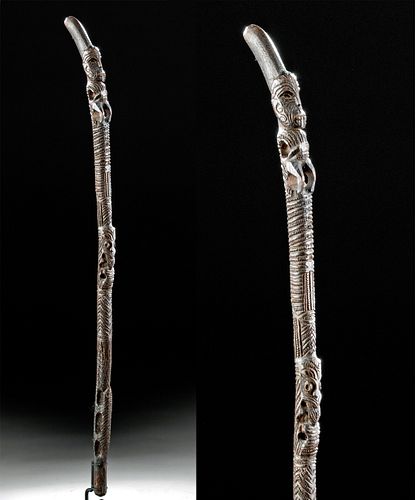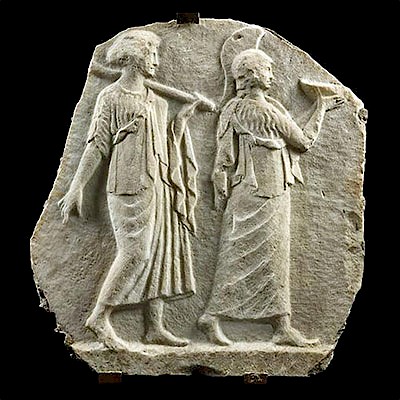19th C. Maori Wood Orator's Walking Staff - Tokotoko
Lot 132b
About Seller
Artemis Fine Arts
686 S Taylor Ave, Ste 106
Louisville, CO 80027
United States
Selling antiquities, ancient and ethnographic art online since 1993, Artemis Gallery specializes in Classical Antiquities (Egyptian, Greek, Roman, Near Eastern), Asian, Pre-Columbian, African / Tribal / Oceanographic art. Our extensive inventory includes pottery, stone, metal, wood, glass and textil...Read more
Categories
Estimate:
$4,000 - $6,000
Absentee vs Live bid
Two ways to bid:
- Leave a max absentee bid and the platform will bid on your behalf up to your maximum bid during the live auction.
- Bid live during the auction and your bids will be submitted real-time to the auctioneer.
Bid Increments
| Price | Bid Increment |
|---|---|
| $0 | $25 |
| $300 | $50 |
| $1,000 | $100 |
| $2,000 | $250 |
| $5,000 | $500 |
| $10,000 | $1,000 |
| $20,000 | $2,500 |
| $50,000 | $5,000 |
| $100,000 | $10,000 |
| $200,000 | $20,000 |
About Auction
By Artemis Fine Arts
Feb 13, 2020
Set Reminder
2020-02-13 10:00:00
2020-02-13 10:00:00
America/New_York
Bidsquare
Bidsquare : Exceptional Antiquities, Asian, Ethnographic
https://www.bidsquare.com/auctions/artemis-gallery/exceptional-antiquities-asian-ethnographic-4848
An important one-day auction featuring museum-worthy examples of Egyptian, Greek, Roman, Etruscan, Near Eastern, Far East / Asian, Pre-Columbian, African / Tribal, Oceanic, Native American, Spanish Colonial, Russian, Fossils, Ancient Jewelry, Fine Art, so much more! Artemis Fine Arts info@artemisgallery.com
An important one-day auction featuring museum-worthy examples of Egyptian, Greek, Roman, Etruscan, Near Eastern, Far East / Asian, Pre-Columbian, African / Tribal, Oceanic, Native American, Spanish Colonial, Russian, Fossils, Ancient Jewelry, Fine Art, so much more! Artemis Fine Arts info@artemisgallery.com
- Lot Description
Oceania, New Zealand, Maori people, ca. 19th century CE. Wow! An incredible hand carved, dark wooden tokotoko, long and straight aside from a gently curved upper end. The tokotoko is a traditional Maori walking stick used by an orator. Carved along its full length aside from its bottom tip, it features: a high relief tiki figure at its curved upper end, bent legs projecting outward with openwork behind its back and under its legs; a mythical bird/human chimera figure known as a manaia, with openwork behind its beak/tongue, at its center; and just above its base, a lizard with openwork under its chin and between its legs and tail. Interspersed between these creatures and carved over their forms are triple haehae lines and dragon tooth notching, characteristic motifs of Maori art that are related to tattoos. Size: 1.4" W x 38.25" H (3.6 cm x 97.2 cm); 40.25" H (102.2 cm) on included custom stand.
Maori wood carving is an incredible art form, its practitioners rightly recognized as masters. Their woodcarving tradition lasted in many areas into the later nineteenth century despite colonization and missionaries. Carving schools in several areas of the country kept the Maori tradition alive. Carvers used local trees, and a prayer known as a karakia would be said prior to cutting them down, thus showing respect for the forest. Massive wooden architectural elements, such as those still preserved at Whakarewarewa, reflect similar carved elements to those on this stick. Indeed, the tokotoko is designed to have motifs associated with the Wharenui, or meeting house in a community. The Kaumatua in the family - an older person who is the keeper of knowledge and passes it on orally - may hold the tokotoko while speaking with the people gathered in the Wharenui for a Hui (gathering).
See another example of a tokotoko that may have been presented to Edward, Prince of Wales (later King Edward VIII) during his visit to New Zealand as part of his tour of the Empire in 1920 in the Royal Collection Trust, Grand Vestibule of Windsor Castle, England (RCIN 69423).
Provenance: private Nevada, USA collection; purchased from Casey Conway, Kingman, Arizona, USA, around 2005; ex-private Southern California, USA collection
All items legal to buy/sell under U.S. Statute covering cultural patrimony Code 2600, CHAPTER 14, and are guaranteed to be as described or your money back.
A Certificate of Authenticity will accompany all winning bids.
We ship worldwide and handle all shipping in-house for your convenience.
#152209Rich patina on all surfaces. Small chips, nicks, and scratches commensurate with age and a stabilized fissure along the bottom openwork area. Otherwise in excellent condition with form and detail beautiful preserved.Condition
- Shipping Info
-
All shipping is handled in-house for your convenience. Your invoice from Artemis Gallery will include shipping calculation instructions. If in doubt, please inquire BEFORE bidding for estimated shipping costs for individual items.
-
- Buyer's Premium



 EUR
EUR CAD
CAD AUD
AUD GBP
GBP MXN
MXN HKD
HKD CNY
CNY MYR
MYR SEK
SEK SGD
SGD CHF
CHF THB
THB













